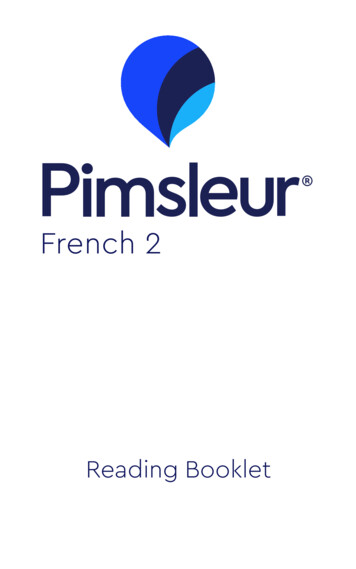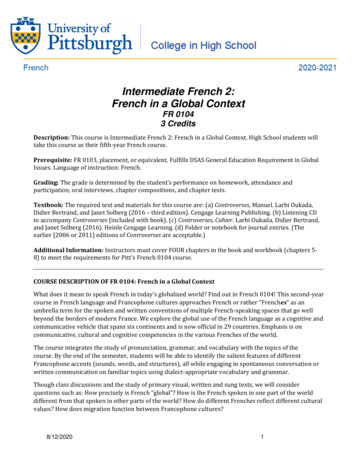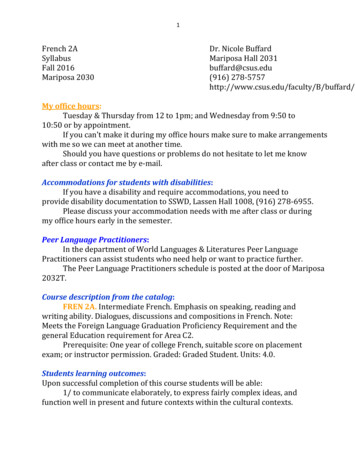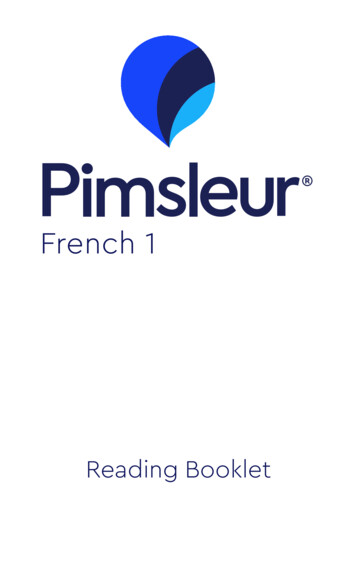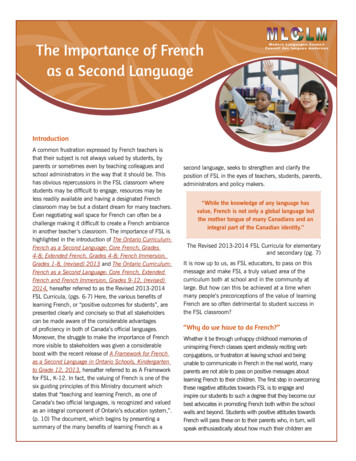
Transcription
The Importance of Frenchas a Second LanguageModer n Languages CouncilConsell des langues moder nesIntroductionA common frustration expressed by French teachers isthat their subject is not always valued by students, byparents or sometimes even by teaching colleagues andschool administrators in the way that it should be. Thishas obvious repercussions in the FSL classroom wherestudents may be difficult to engage, resources may beless readily available and having a designated Frenchclassroom may be but a distant dream for many teachers.Even negotiating wall space for French can often be achallenge making it difficult to create a French ambiancein another teacher’s classroom. The importance of FSL ishighlighted in the introduction of The Ontario Curriculum:French as a Second Language: Core French, Grades4-8; Extended French, Grades 4-8; French Immersion,Grades 1-8, (revised) 2013 and The Ontario Curriculum:French as a Second Language: Core French, ExtendedFrench and French Immersion, Grades 9-12, (revised)2014, hereafter referred to as the Revised 2013-2014FSL Curricula, (pgs. 6-7) Here, the various benefits oflearning French, or “positive outcomes for students”, arepresented clearly and concisely so that all stakeholderscan be made aware of the considerable advantagesof proficiency in both of Canada’s official languages.Moreover, the struggle to make the importance of Frenchmore visible to stakeholders was given a considerableboost with the recent release of A Framework for Frenchas a Second Language in Ontario Schools, Kindergartento Grade 12, 2013, hereafter referred to as A Frameworkfor FSL, K-12. In fact, the valuing of French is one of thesix guiding principles of this Ministry document whichstates that “teaching and learning French, as one ofCanada’s two official languages, is recognized and valuedas an integral component of Ontario’s education system,”.(p. 10) The document, which begins by presenting asummary of the many benefits of learning French as asecond language, seeks to strengthen and clarify theposition of FSL in the eyes of teachers, students, parents,administrators and policy makers.“While the knowledge of any language hasvalue, French is not only a global language butthe mother tongue of many Canadians and anintegral part of the Canadian identity.”The Revised 2013-2014 FSL Curricula for elementaryand secondary (pg. 7)It is now up to us, as FSL educators, to pass on thismessage and make FSL a truly valued area of thecurriculum both at school and in the community atlarge. But how can this be achieved at a time whenmany people’s preconceptions of the value of learningFrench are so often detrimental to student success inthe FSL classroom?“Why do we have to do French?”Whether it be through unhappy childhood memories ofuninspiring French classes spent endlessly reciting verbconjugations, or frustration at leaving school and beingunable to communicate in French in the real world, manyparents are not able to pass on positive messages aboutlearning French to their children. The first step in overcomingthese negative attitudes towards FSL is to engage andinspire our students to such a degree that they become ourbest advocates in promoting French both within the schoolwalls and beyond. Students with positive attitudes towardsFrench will pass these on to their parents who, in turn, willspeak enthusiastically about how much their children are
now enjoying French to their friends. Good news, as theysay, travels fast. Of course, the single biggest influence indetermining whether students have a favourable experience inFrench class belongs to the teacher. No single factor can affectstudent attitude more than the degree to which the teachercan bring passion, creativity, caring and sound pedagogy intohis or her classroom. Engaging the students in this way willcertainly help win them over to French at least in the shortterm. The question is, how can we instill in them the beliefthat proficiency in French is something to be valued not justwhile still at school, but also in their lives beyond grade 12?How can we convince them that becoming lifelong languagelearners can actually make a real difference in their livesacademically, professionally and even socially?thinking, problem solving and listening skills, and evenan improved memory. Proficiency in both of Canada’s official languagesbrings many economic benefits, and can lead toimproved employment opportunities and greatercareer flexibility both in Canada and around theworld. In an increasingly global market, bilingual staffis becoming highly sought after in many areas andtends to earn a higher average salary than peoplewith just one language. Moreover, the Internet hasmade global communication even more important. Research has shown that learning a secondlanguage can have a positive effect on first languagedevelopment. The transfer of literacy skills from onelanguage to another leads to both languages beingenhanced. This, in turn, can result in improvementin other areas of the curriculum. Acquiring a second language makes it easier to learn athird, fourth or fifth language. Students with a second language tend to perform betterat standardized tests in reading, language and math. The social aspect of learning a second languagecan also be significant. Not only does it develop thelearner’s social and interpersonal skills, it can alsogive the learner a more global perspective by makingit easier to meet people from different backgrounds,to experience new cultures, and to travel to variouscountries around the world. There are also emotional benefits associated withlearning a second language such as improved selfesteem and self-confidence.Reproduced courtesy of Canadian Parents for FrenchWhat are the Benefits of Learning French as aSecond Language?The benefits of learning French as a Second Language canbe summarized as follows: Bilingualism is at the core of Canada’s nationalidentity and being able to communicate in both officiallanguages can open up many opportunities. Learning a second language has been shown to bringcognitive and academic benefits. Numerous studiessuggest that learning a second language can lead toan increase in mental flexibility, brain power, creative Learning a second language leads to greater appreciationof, and sensitivity towards, linguistic and cultural diversityin Canada and around the world. This can also lead to abroader understanding of global issues; French is the first or second language of over 40countries and is spoken on every continent. In fact, it isthought that 200 million people around the world speakFrench. English and French are the only languagesspoken on all 5 continents and taught in every countryin the world. It is estimated that 100 million people arelearning French. The number of French speakers hastripled in the last 50 years. France is also the world’smost popular tourist destination. Speaking French opens doors to the worlds of music,cinema, fashion, art, and literature.The Importance of French as a Second Language - pg. 2
Pourquoi parlerWHY LEARNFRENCHTwo languages. twice the opportunity!FRANÇAISDeux langues. un monde de possibilités !200 MILLION PEOPLE IN THE WORLD UNDERSTAND, SPEAK, READ OR WRITE FRENCH FRENCH IS AN OFFICIAL LANGUAGE OF 29 COUNTRIES FRENCH IS THE MOSTWIDELY TAUGHT SECOND LANGUAGE AFTER ENGLISH FRENCH IS SPOKEN IN OVER43 COUNTRIES IN THE WORLD FRENCH IS THE 9TH MOST WIDELY SPOKENLANGUAGE IN THE WORLD SPEAKING A NEW LANGUAGE HELPS YOU TO GET TOKNOW AND UNDERSTAND ANOTHER CULTURE FRENCH IS THE OFFICIALLANGUAGE OF THE UNIVERSAL POSTAL UNION FRENCH IS THE OFFICIALLANGUAGE OF THE RED CROSS FRENCH RESTAURANT MENUS WILL BE EASIER TODECODE FRENCH IS ONE OF THE TWO OFFICIAL LANGUAGES OF THE OLYMPICGAMES FRENCH IS ONE OF THE OFFICIAL LANGUAGES OF THE UNITED NATIONS,NATO AND UNESCO TO BE ABLE TO SAY MORE THAN “OÙ SONT LES TOILETTES SVP?” IN CANADA, FRENCH IS AN OFFICIAL LANGUAGE IN NEW BRUNSWICK,QUEBEC, THE NORTHWEST TERRITORIES, THE YUKON AND NUNAVUT FRENCH IS AMAJOR LANGUAGE OF HIGH TECH AND BUSINESS IN THE WORLD FRENCH OPENSDOORS TO CAREERS IN TEACHING, BUSINESS, DIPLOMACY, RESEARCH,TRANSLATION, INTERPRETATION, TRAVEL, AND MORE FRENCH IS SPOKEN IN 2 OFTHE G8 COUNTRIES IF YOU BUMP INTO JOHNNY DEPP OR SIDNEY CROSBY, YOUCOULD HAVE A CONVERSATION IN FRENCH THERE ARE WELL OVER 33 MILLIONFRENCH-SPEAKERS IN THE AMERICAS OVER 100 MILLION STUDENTS IN THE WORLDARE LEARNING FRENCH LEARNING ANOTHER LANGUAGE CAN HELP YOU TOUNDERSTAND YOUR OWN FRENCH IS THE LINGUA FRANCA OF ART, CUISINE,DANCE, AND FASHION SPEAKING FRENCH ENHANCES YOUR TRAVELOPPORTUNITIES THE NUMBER OF FRENCH-SPEAKERS HAS TRIPLED IN THE LAST 50YEARS FRENCH IS THE ONLY LANGUAGE OTHER THAN ENGLISH TAUGHT IN EVERYSINGLE COUNTRY IN THE WORLD THERE ARE OVER 700 FRENCH-LANGUAGEUNIVERSITIES IN THE WORLD FRENCH GIVES ACCESS TO A HUGE NUMBER OFMOVIES, BOOKS, AND WEBSITES IN THEIR ORIGINAL LANGUAGE KNOWINGANOTHER LANGUAGE LOOKS IMPRESSIVE ON A RESUME FRENCH-SPEAKINGAFRICA REPRESENTS AN AREA LARGER THAN THE USA MANY SCHOLARSHIPS AREOFFERED TO BILINGUAL STUDENTS FRENCH IS THE LANGUAGE OF LOVE SALARIESARE HIGHER FOR BILINGUAL WORKERS THAN THEY ARE FOR UNILINGUAL WORKERS200 MILLIONS DE PERSONNES AU MONDE PEUVENT LIRE, ÉCRIRE, PARLER OUCOMPRENDRE LE FRANÇAIS 29 PAYS ONT LE FRANÇAIS COMME LANGUEOFFICIELLE LE FRANÇAIS EST LA LANGUE LA PLUS ENSEIGNÉE AU MONDE APRÈSL’ANGLAIS ON PARLE FRANÇAIS DANS PLUS DE 43 PAYS AU MONDE LEFRANÇAIS EST LA 9e LANGUE LA PLUS PARLÉE AU MONDE PARLER UNE NOUVELLELANGUE AIDE À CONNAÎTRE ET COMPRENDRE UNE AUTRE CULTURE LE FRANÇAISEST LA LANGUE OFFICIELLE DE L’UNION POSTALE UNIVERSELLE LE FRANÇAIS ESTLA LANGUE OFFICIELLE DE LA CROIX ROUGE LE FRANÇAIS AIDE À DÉCHIFFRERLES MENUS DES RESTAURANTS LE FRANÇAIS EST UNE DES DEUX LANGUESOFFICIELLES DES JEUX OLYMPIQUES LE FRANÇAIS EST UNE DES LANGUESOFFICIELLES DE TRAVAIL DES NATIONS UNIES, DE L’OTAN ET DE L’UNESCO AUCANADA, LE FRANÇAIS EST UNE LANGUE OFFICIELLE AU NOUVEAU-BRUNSWICK,AU QUÉBEC, AUX TERRITOIRES DU NORD-OUEST, AU YUKON ET AU NUNAVUT POUVOIR DIRE PLUS QUE « OÙ SONT LES TOILETTES SVP ? » LE FRANÇAIS EST UNELANGUE IMPORTANTE DANS LE MONDE DES AFFAIRES ET DE LA TECHNOLOGIE LEFRANÇAIS OUVRE DES PORTES VERS DES CARRIÈRES EN ENSEIGNEMENT, AFFAIRES,DIPLOMATIE, RECHERCHE, TRADUCTION, INTERPRÉTATION, VOYAGE ET PLUS ONPARLE FRANÇAIS DANS 2 DES PAYS DU G8 SI JAMAIS VOUS RENCONTREZJOHNNY DEPP OU SIDNEY CROSBY, VOUS POURRIEZ LEUR PARLER EN FRANÇAIS IL Y A PLUS DE 33 MILLIONS DE FRANCOPHONES ET DE FRANCOPHILES VIVANTDANS LES AMÉRIQUES PLUS DE 100 MILLIONS D’ÉTUDIANTS AU MONDEAPPRENNENT LE FRANÇAIS LE FRANÇAIS EST LA LANGUE DE L’AMOUR LEFRANÇAIS EST LA LINGUA FRANCA DE L’ART, DE LA CUISINE, DE LA DANSE ET DE LAMODE PARLER FRANÇAIS ENRICHIT SES OPPORTUNITÉS DE VOYAGE LENOMBRE DE FRANCOPHONES DANS LE MONDE A TRIPLÉ DEPUIS 50 ANS LEFRANÇAIS EST LA SEULE LANGUE À PART L’ANGLAIS QUI EST ENSEIGNÉE DANSTOUS LES PAYS DU MONDE ON COMPTE PLUS DE 700 UNIVERSITÉSFRANCOPHONES AU MONDE LE FRANÇAIS DONNE ACCÈS À UNE MULTITUDE DEFILMS, LIVRES ET SITES WEB DANS LEUR VERSION ORIGINALE PARLER UNE AUTRELANGUE PARAÎT BIEN SUR UN CV L’AFRIQUE FRANCOPHONE REPRÉSENTE UNERÉGION PLUS VASTE QUE CELLE DES ÉTATS-UNIS DE NOMBREUSES BOURSES SONTOFFERTES AUX ÉTUDIANTS BILINGUES APPRENDRE UNE AUTRE LANGUE PEUTAIDER À MIEUX COMPRENDRE ET PARFAIRE LA SIENNE LA MOYENNE SALARIALEDES EMPLOYÉS BILINGUES EST PLUS ÉLEVÉE QUE CELLE DES EMPLOYÉS .org French for the Future 2012 Le français pour l’avenir 2012Reproduced courtesy of French for the Future The benefits of learning a second language can last a lifetime. Recent studies have shown that having asecond language can reduce the rate of mental decline in the elderly and lessen the risk of suffering fromdiseases such as Alzheimer’s.What Can We do to Make French More Valued in Our Schools and Our Communities?A Framework for FSL, K-12 (pgs. 14, 18, 19, 36 and 37) and the module Promoting French as a Second Languageboth contain numerous ideas on how to make FSL more valued and our students more motivated to learn. The following“Action Plan” checklist, based on these ideas, could be discussed and shared with colleagues and school administratorsto help co-ordinate a strategy designed to make FSL more valued both within the school and in the local community:GoalPossible ActionCoordinatingTeacher(s)TimelineReflectionTo raiseawareness of thebenefits of FSLAs part of FrenchMonth, each dailyannouncementfeatures one benefitof learning French.Each benefit is thenincorporated into aposter and placedon the school’s mainbulletin boardMadame Murphyand MonsieurRouxOctoberNext year, the benefitposters will alsofeature in the schoolnewsletter and on theschool websiteTo celebrate theaccomplishmentsof students inFSLLes élèves du moisfrom each class arefeatured in a specialsection in the schoolnewsletter and on theschool websiteMadame CholetEverymonth,September JuneTo acknowledge theachievements of agreater number ofstudents, include“most improved”students in the awardsThe Importance of French as a Second Language - pg. 3
The Importance of French as a Second Language - pg. 4 To inform the public about resources available to them such as The Revised2013-2014 FSL Curricula for elementary and secondary. and A Frameworkfor FSL, K-12. To communicate with the school administration (and, where appropriate, thehome room teacher) in order to make the FSL learning experience we offer ourstudents as effective as possible. How can a French classroom environmentbe created? What French resources are required to help meet the goals of theOntario Curriculum? To promote French around the school, as well as in French class, so that itbecomes part of the school culture To inform parents about how French is taught and what they can do tosupport the program To expose students to role models who use French in their work or daily lives(particularly if they have learnt French as a second language) To raise the visibility of French to people in the community. Can Frenchalready be found in the community at large? (e.g., public libraries, restaurants,book stores, movie theatres, hockey teams, francophone clubs, and othercommunity resources) To create and maintain a positive classroom atmosphere which prioritizes andcelebrates student success and achievement To bring the real Francophone world into the classroom through technology To promote a new, more functional approach to FSL, emphasizing what eachstudent can do in French as outlined in The Revised 2013-2014 FSLCurricula for elementary and secondary. To make French more relevant andappealing to our students through the use of authentic tasks based on theirinterests and real world experiences To celebrate the accomplishments of students in FSL To raise awareness of the benefits of eReflection
ResourcesCanadian Parents for Frenchhttp://on.cpf.caCurriculum Services Canada (2012). A Guide to Reflective Practice for Core French Teachers, Module 2 Positive Learning chersFrench for the Futurehttp://www.french-future.orgOntario Ministry of Education (2013). A Framework for French as a Second Language in Ontario Schools,Kindergarten to Grade lOntario Ministry of Education (2013). The Ontario Curriculum: French as a Second Language: Core, Grades4–8; Extended, Grades 4–8; Immersion, Grades 1–8, lementary/fsl.htmlOntario Ministry of Education, The Ontario Curriculum: French as a Second Language: Core French, ExtendedFrench and French Immersion, Grades 9-12, (revised) ary/fsl.htmlThe Importance of French as a Second Language - pg. 5
French as a Second Language: Core French, Extended French and French Immersion, Grades 9-12, (revised) 2014, hereafter referred to as the Revised 2013-2014 FSL Curricula, (pgs. 6-7) Here, the various benefits of learning French, or "positive outcomes for students", are presented clearly and concisely so that all stakeholders


